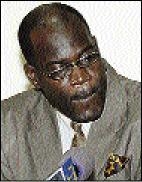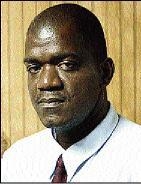

Bailey
(left) and Anderson (right)
If the Ministry of Education accepts Superintendent Fitz Bailey's suggestion every child could become a whistle-blower. And there would be no need to enact legislation for it to happen.
Superintendent Bailey, boss of the Jamaica Constabulary Force's Organised Crime Investigation Division (OCID), told The Sunday Gleaner that in addition to other measures, whistles could be given to schoolchildren as a means of sounding an alarm whenever they are in danger.
The senior cop explained that implementing such an initiative would require a public education campaign designed to sensitise members of the public as to what to do when they hear the frantic sounds from a child's whistle.
Police sources have admitted to The Sunday Gleaner that predators are targeting unsuspecting students, abducting them and demanding millions of dollars in ransom from their caregivers.
In the past two weeks, the police sources have confirmed three brazen incidents of kidnapping in Kingston, central Jamaica and Montego Bay.
In one incident, a male student from Jacks Hill in upscale St Andrew was held, but later returned after the helper to whom the kidnappers spoke made an alarm. The child was subsequently returned home.
A second-form student from a prominent high school in Montego Bay was kidnapped on her way from school. The kidnappers demanded and received a $4-million payment and the student was returned to her parents unharmed.
child back with family
Yesterday, The Gleaner reported that the 12-year-old son of a prominent businessman in central Jamaica was abducted earlier in the week, but is now back with his family.
There were close to 1,500 reported cases of missing persons last year. Almost 1,000 of them were children. It is not clear how many of these cases were abductions.
Bailey urged parents to teach their children what to do if approached by strangers. He said parents should endeavour to pick up and drop off their children to school themselves. If that is not possible, a trusted individual should be appointed to undertake the responsibility.
Sylvester Anderson, immediate past president of the National Parent-Teacher Association of Jamaica, believes the 'whistle-blower' concept is worth examining. But Anderson stressed that the number-one defensive mechanism is educating your child. Schooling him/her to clear and present dangers that exist is paramount.
Emergency systems in place
Ananda Alert, a nationwide child abduction alert system named in honour of 11-year-old Ananda Dean who was abducted and murdered in 2008, was launched in May this year. The multi-agency system is designed to alert the nation whenever a child is reported missing.
If you see a child in danger, you can call:
Crime Stop - 311
Operation Kingfish - 811
Police Control - 119
Centre for Investigation of Sexual Offences and Child Abuse - 960 8516
In 2008, there were 1,446 reported cases of missing persons.
960 of them were children.
Seven were found murdered.
181 were not found.
It is not clear how many of these cases were abductions (i.e., persons taken for unknown cause).
Vigilance virtues
Never leave children alone or unsupervised.
Be careful with whom you leave children.
As soon as possible, teach children steps to avoid being abducted or kidnapped.
Bring it to the attention of an adult if children are in an uncomfortable situation.
Where possible, don't take taxis alone.
Walk in groups.
Never loiter on the street.
Avoid walking near abandoned buildings, lots and taking shortcuts.
Police tips
Once your child is missing, you should …
Try immediately to contact friends, relatives and associates of the child.
Go to your local police station and file a missing person report. Do NOT wait 24 hours.
In attending that station, take a most recent photograph of the missing child.
Ensure that you are given a receipt by the police after making your report. If you are not satisfied with the response of the police, ask for the station supervisor or superintendent in charge.
If you locate the child before the police, inform them immediately.